Zhenru Zhang
additional authors not shown
WorldPM: Scaling Human Preference Modeling
May 15, 2025Abstract:Motivated by scaling laws in language modeling that demonstrate how test loss scales as a power law with model and dataset sizes, we find that similar laws exist in preference modeling. We propose World Preference Modeling$ (WorldPM) to emphasize this scaling potential, where World Preference embodies a unified representation of human preferences. In this paper, we collect preference data from public forums covering diverse user communities, and conduct extensive training using 15M-scale data across models ranging from 1.5B to 72B parameters. We observe distinct patterns across different evaluation metrics: (1) Adversarial metrics (ability to identify deceptive features) consistently scale up with increased training data and base model size; (2) Objective metrics (objective knowledge with well-defined answers) show emergent behavior in larger language models, highlighting WorldPM's scalability potential; (3) Subjective metrics (subjective preferences from a limited number of humans or AI) do not demonstrate scaling trends. Further experiments validate the effectiveness of WorldPM as a foundation for preference fine-tuning. Through evaluations on 7 benchmarks with 20 subtasks, we find that WorldPM broadly improves the generalization performance across human preference datasets of varying sizes (7K, 100K and 800K samples), with performance gains exceeding 5% on many key subtasks. Integrating WorldPM into our internal RLHF pipeline, we observe significant improvements on both in-house and public evaluation sets, with notable gains of 4% to 8% in our in-house evaluations.
Qwen3 Technical Report
May 14, 2025
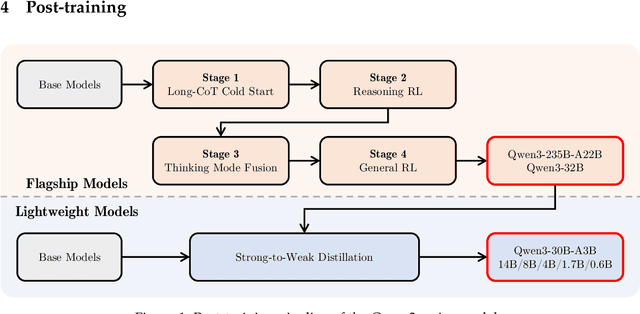

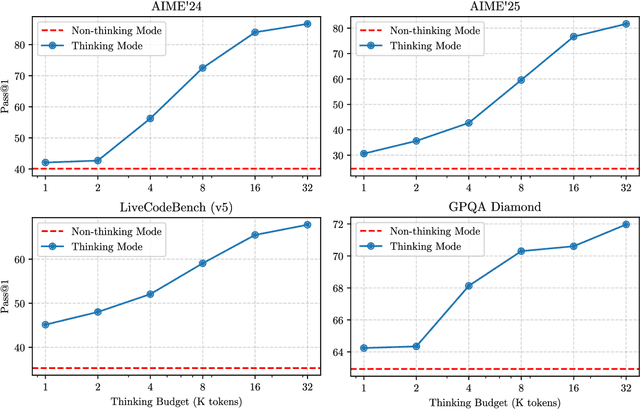
Abstract:In this work, we present Qwen3, the latest version of the Qwen model family. Qwen3 comprises a series of large language models (LLMs) designed to advance performance, efficiency, and multilingual capabilities. The Qwen3 series includes models of both dense and Mixture-of-Expert (MoE) architectures, with parameter scales ranging from 0.6 to 235 billion. A key innovation in Qwen3 is the integration of thinking mode (for complex, multi-step reasoning) and non-thinking mode (for rapid, context-driven responses) into a unified framework. This eliminates the need to switch between different models--such as chat-optimized models (e.g., GPT-4o) and dedicated reasoning models (e.g., QwQ-32B)--and enables dynamic mode switching based on user queries or chat templates. Meanwhile, Qwen3 introduces a thinking budget mechanism, allowing users to allocate computational resources adaptively during inference, thereby balancing latency and performance based on task complexity. Moreover, by leveraging the knowledge from the flagship models, we significantly reduce the computational resources required to build smaller-scale models, while ensuring their highly competitive performance. Empirical evaluations demonstrate that Qwen3 achieves state-of-the-art results across diverse benchmarks, including tasks in code generation, mathematical reasoning, agent tasks, etc., competitive against larger MoE models and proprietary models. Compared to its predecessor Qwen2.5, Qwen3 expands multilingual support from 29 to 119 languages and dialects, enhancing global accessibility through improved cross-lingual understanding and generation capabilities. To facilitate reproducibility and community-driven research and development, all Qwen3 models are publicly accessible under Apache 2.0.
START: Self-taught Reasoner with Tools
Mar 07, 2025Abstract:Large reasoning models (LRMs) like OpenAI-o1 and DeepSeek-R1 have demonstrated remarkable capabilities in complex reasoning tasks through the utilization of long Chain-of-thought (CoT). However, these models often suffer from hallucinations and inefficiencies due to their reliance solely on internal reasoning processes. In this paper, we introduce START (Self-Taught Reasoner with Tools), a novel tool-integrated long CoT reasoning LLM that significantly enhances reasoning capabilities by leveraging external tools. Through code execution, START is capable of performing complex computations, self-checking, exploring diverse methods, and self-debugging, thereby addressing the limitations of LRMs. The core innovation of START lies in its self-learning framework, which comprises two key techniques: 1) Hint-infer: We demonstrate that inserting artificially designed hints (e.g., ``Wait, maybe using Python here is a good idea.'') during the inference process of a LRM effectively stimulates its ability to utilize external tools without the need for any demonstration data. Hint-infer can also serve as a simple and effective sequential test-time scaling method; 2) Hint Rejection Sampling Fine-Tuning (Hint-RFT): Hint-RFT combines Hint-infer and RFT by scoring, filtering, and modifying the reasoning trajectories with tool invocation generated by a LRM via Hint-infer, followed by fine-tuning the LRM. Through this framework, we have fine-tuned the QwQ-32B model to achieve START. On PhD-level science QA (GPQA), competition-level math benchmarks (AMC23, AIME24, AIME25), and the competition-level code benchmark (LiveCodeBench), START achieves accuracy rates of 63.6%, 95.0%, 66.7%, 47.1%, and 47.3%, respectively. It significantly outperforms the base QwQ-32B and achieves performance comparable to the state-of-the-art open-weight model R1-Distill-Qwen-32B and the proprietary model o1-Preview.
The Lessons of Developing Process Reward Models in Mathematical Reasoning
Jan 13, 2025



Abstract:Process Reward Models (PRMs) emerge as a promising approach for process supervision in mathematical reasoning of Large Language Models (LLMs), which aim to identify and mitigate intermediate errors in the reasoning processes. However, the development of effective PRMs faces significant challenges, particularly in data annotation and evaluation methodologies. In this paper, through extensive experiments, we demonstrate that commonly used Monte Carlo (MC) estimation-based data synthesis for PRMs typically yields inferior performance and generalization compared to LLM-as-a-judge and human annotation methods. MC estimation relies on completion models to evaluate current-step correctness, leading to inaccurate step verification. Furthermore, we identify potential biases in conventional Best-of-N (BoN) evaluation strategies for PRMs: (1) The unreliable policy models generate responses with correct answers but flawed processes, leading to a misalignment between the evaluation criteria of BoN and the PRM objectives of process verification. (2) The tolerance of PRMs of such responses leads to inflated BoN scores. (3) Existing PRMs have a significant proportion of minimum scores concentrated on the final answer steps, revealing the shift from process to outcome-based assessment in BoN Optimized PRMs. To address these challenges, we develop a consensus filtering mechanism that effectively integrates MC estimation with LLM-as-a-judge and advocates a more comprehensive evaluation framework that combines response-level and step-level metrics. Based on the mechanisms, we significantly improve both model performance and data efficiency in the BoN evaluation and the step-wise error identification task. Finally, we release a new state-of-the-art PRM that outperforms existing open-source alternatives and provides practical guidelines for future research in building process supervision models.
Disentangling Reasoning Tokens and Boilerplate Tokens For Language Model Fine-tuning
Dec 19, 2024



Abstract:When using agent-task datasets to enhance agent capabilities for Large Language Models (LLMs), current methodologies often treat all tokens within a sample equally. However, we argue that tokens serving different roles - specifically, reasoning tokens versus boilerplate tokens (e.g., those governing output format) - differ significantly in importance and learning complexity, necessitating their disentanglement and distinct treatment. To address this, we propose a novel Shuffle-Aware Discriminator (SHAD) for adaptive token discrimination. SHAD classifies tokens by exploiting predictability differences observed after shuffling input-output combinations across samples: boilerplate tokens, due to their repetitive nature among samples, maintain predictability, whereas reasoning tokens do not. Using SHAD, we propose the Reasoning-highlighted Fine-Tuning (RFT) method, which adaptively emphasizes reasoning tokens during fine-tuning, yielding notable performance gains over common Supervised Fine-Tuning (SFT).
Qwen2.5 Technical Report
Dec 19, 2024

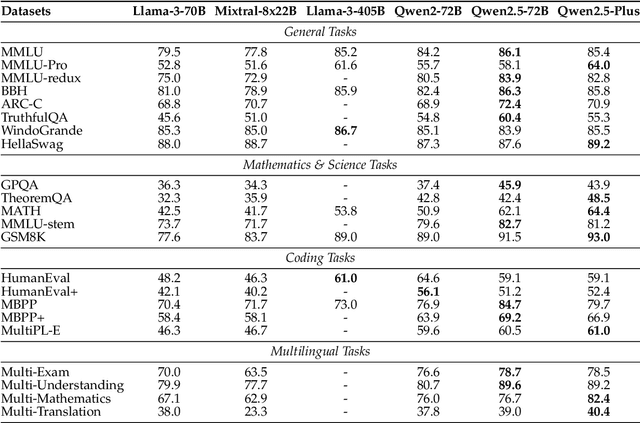
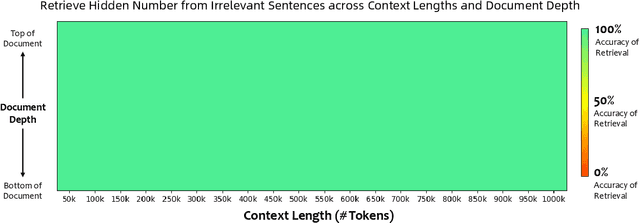
Abstract:In this report, we introduce Qwen2.5, a comprehensive series of large language models (LLMs) designed to meet diverse needs. Compared to previous iterations, Qwen 2.5 has been significantly improved during both the pre-training and post-training stages. In terms of pre-training, we have scaled the high-quality pre-training datasets from the previous 7 trillion tokens to 18 trillion tokens. This provides a strong foundation for common sense, expert knowledge, and reasoning capabilities. In terms of post-training, we implement intricate supervised finetuning with over 1 million samples, as well as multistage reinforcement learning. Post-training techniques enhance human preference, and notably improve long text generation, structural data analysis, and instruction following. To handle diverse and varied use cases effectively, we present Qwen2.5 LLM series in rich sizes. Open-weight offerings include base and instruction-tuned models, with quantized versions available. In addition, for hosted solutions, the proprietary models currently include two mixture-of-experts (MoE) variants: Qwen2.5-Turbo and Qwen2.5-Plus, both available from Alibaba Cloud Model Studio. Qwen2.5 has demonstrated top-tier performance on a wide range of benchmarks evaluating language understanding, reasoning, mathematics, coding, human preference alignment, etc. Specifically, the open-weight flagship Qwen2.5-72B-Instruct outperforms a number of open and proprietary models and demonstrates competitive performance to the state-of-the-art open-weight model, Llama-3-405B-Instruct, which is around 5 times larger. Qwen2.5-Turbo and Qwen2.5-Plus offer superior cost-effectiveness while performing competitively against GPT-4o-mini and GPT-4o respectively. Additionally, as the foundation, Qwen2.5 models have been instrumental in training specialized models such as Qwen2.5-Math, Qwen2.5-Coder, QwQ, and multimodal models.
ProcessBench: Identifying Process Errors in Mathematical Reasoning
Dec 10, 2024



Abstract:As language models regularly make mistakes when solving math problems, automated identification of errors in the reasoning process becomes increasingly significant for their scalable oversight. In this paper, we introduce ProcessBench for measuring the ability to identify erroneous steps in mathematical reasoning. It consists of 3,400 test cases, primarily focused on competition- and Olympiad-level math problems. Each test case contains a step-by-step solution with error location annotated by human experts. Models are required to identify the earliest step that contains an error, or conclude that all steps are correct. We conduct extensive evaluation on ProcessBench, involving two types of models: process reward models (PRMs) and critic models, where for the latter we prompt general language models to critique each solution step by step. We draw two main observations: (1) Existing PRMs typically fail to generalize to more challenging math problems beyond GSM8K and MATH. They underperform both critic models (i.e., prompted general language models) and our own trained PRM that is straightforwardly fine-tuned on the PRM800K dataset. (2) The best open-source model, QwQ-32B-Preview, has demonstrated the critique capability competitive with the proprietary model GPT-4o, despite that it still lags behind the reasoning-specialized o1-mini. We hope ProcessBench can foster future research in reasoning process assessment, paving the way toward scalable oversight of language models.
Qwen2.5-Math Technical Report: Toward Mathematical Expert Model via Self-Improvement
Sep 18, 2024Abstract:In this report, we present a series of math-specific large language models: Qwen2.5-Math and Qwen2.5-Math-Instruct-1.5B/7B/72B. The core innovation of the Qwen2.5 series lies in integrating the philosophy of self-improvement throughout the entire pipeline, from pre-training and post-training to inference: (1) During the pre-training phase, Qwen2-Math-Instruct is utilized to generate large-scale, high-quality mathematical data. (2) In the post-training phase, we develop a reward model (RM) by conducting massive sampling from Qwen2-Math-Instruct. This RM is then applied to the iterative evolution of data in supervised fine-tuning (SFT). With a stronger SFT model, it's possible to iteratively train and update the RM, which in turn guides the next round of SFT data iteration. On the final SFT model, we employ the ultimate RM for reinforcement learning, resulting in the Qwen2.5-Math-Instruct. (3) Furthermore, during the inference stage, the RM is used to guide sampling, optimizing the model's performance. Qwen2.5-Math-Instruct supports both Chinese and English, and possess advanced mathematical reasoning capabilities, including Chain-of-Thought (CoT) and Tool-Integrated Reasoning (TIR). We evaluate our models on 10 mathematics datasets in both English and Chinese, such as GSM8K, MATH, GaoKao, AMC23, and AIME24, covering a range of difficulties from grade school level to math competition problems.
Qwen2 Technical Report
Jul 16, 2024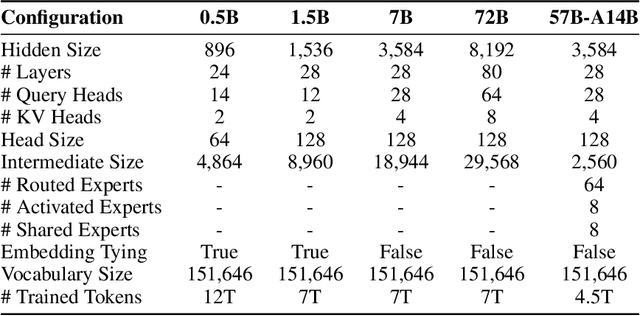
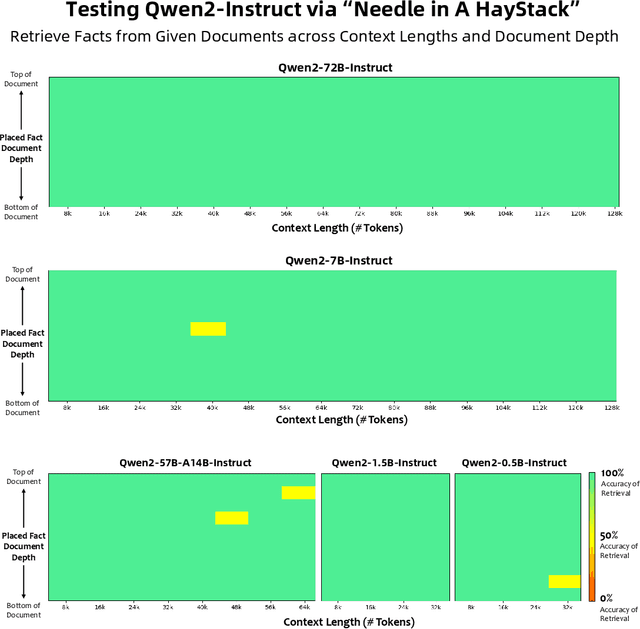
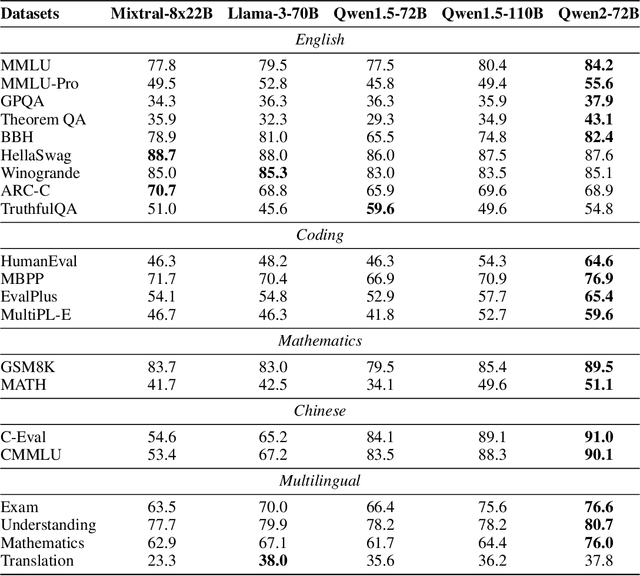
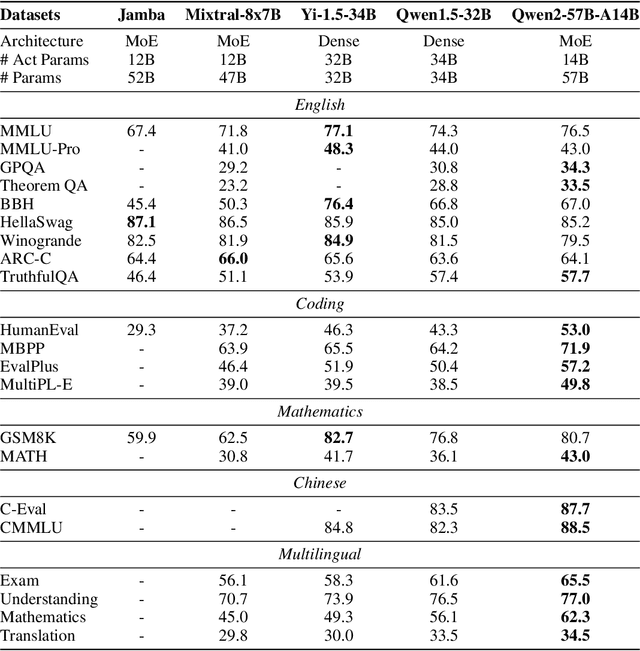
Abstract:This report introduces the Qwen2 series, the latest addition to our large language models and large multimodal models. We release a comprehensive suite of foundational and instruction-tuned language models, encompassing a parameter range from 0.5 to 72 billion, featuring dense models and a Mixture-of-Experts model. Qwen2 surpasses most prior open-weight models, including its predecessor Qwen1.5, and exhibits competitive performance relative to proprietary models across diverse benchmarks on language understanding, generation, multilingual proficiency, coding, mathematics, and reasoning. The flagship model, Qwen2-72B, showcases remarkable performance: 84.2 on MMLU, 37.9 on GPQA, 64.6 on HumanEval, 89.5 on GSM8K, and 82.4 on BBH as a base language model. The instruction-tuned variant, Qwen2-72B-Instruct, attains 9.1 on MT-Bench, 48.1 on Arena-Hard, and 35.7 on LiveCodeBench. Moreover, Qwen2 demonstrates robust multilingual capabilities, proficient in approximately 30 languages, spanning English, Chinese, Spanish, French, German, Arabic, Russian, Korean, Japanese, Thai, Vietnamese, and more, underscoring its versatility and global reach. To foster community innovation and accessibility, we have made the Qwen2 model weights openly available on Hugging Face and ModelScope, and the supplementary materials including example code on GitHub. These platforms also include resources for quantization, fine-tuning, and deployment, facilitating a wide range of applications and research endeavors.
Qwen Technical Report
Sep 28, 2023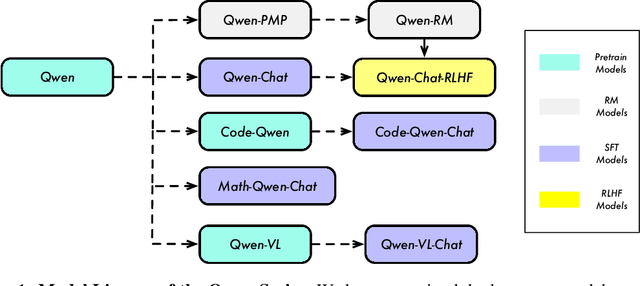

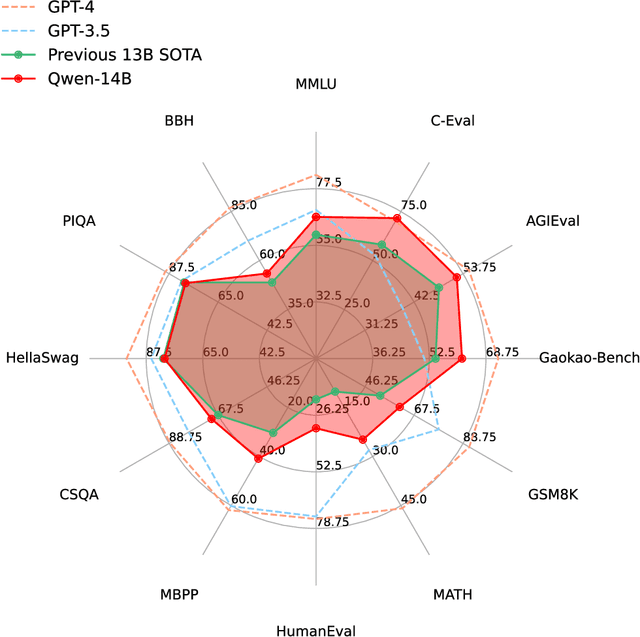
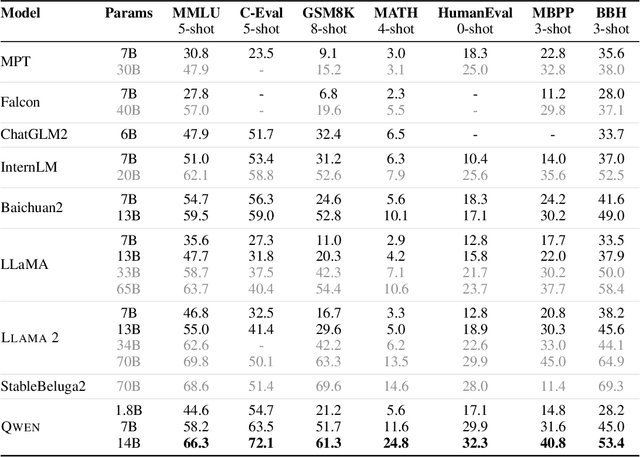
Abstract:Large language models (LLMs) have revolutionized the field of artificial intelligence, enabling natural language processing tasks that were previously thought to be exclusive to humans. In this work, we introduce Qwen, the first installment of our large language model series. Qwen is a comprehensive language model series that encompasses distinct models with varying parameter counts. It includes Qwen, the base pretrained language models, and Qwen-Chat, the chat models finetuned with human alignment techniques. The base language models consistently demonstrate superior performance across a multitude of downstream tasks, and the chat models, particularly those trained using Reinforcement Learning from Human Feedback (RLHF), are highly competitive. The chat models possess advanced tool-use and planning capabilities for creating agent applications, showcasing impressive performance even when compared to bigger models on complex tasks like utilizing a code interpreter. Furthermore, we have developed coding-specialized models, Code-Qwen and Code-Qwen-Chat, as well as mathematics-focused models, Math-Qwen-Chat, which are built upon base language models. These models demonstrate significantly improved performance in comparison with open-source models, and slightly fall behind the proprietary models.
 Add to Chrome
Add to Chrome Add to Firefox
Add to Firefox Add to Edge
Add to Edge